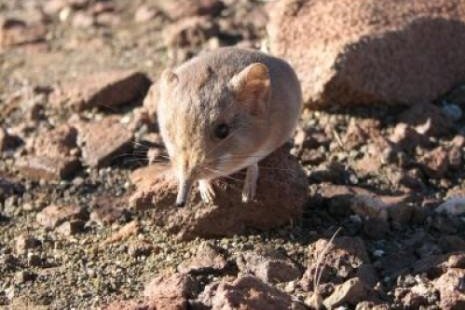Etendeka round-eared sengi (Galen Rathbun/California Academy of Sciences)
WINDHOEK, Namibia, June 27 (UPI) -- Like many of its brethren, a newly discovered elephant shrew species has a protruding snout that vaguely resembles the trunk of an elephant. But the species doesn't just look like an elephant, it shares genes with an elephant.
The discovery of the new elephant shrew -- a group of mice known in Africa by their Bantu-derived name sengi -- began a few years ago when researchers at the California Academy of Sciences noticed the specimens they'd collected in the remote northwestern region of Namibia didn't look like any of the sengis in the museum collections they'd studied.
To confirm their shrewd suspicions that they'd discovered a new type of sengi, the researchers returned to the same region of Namibia several times from 2005-2011 and collected 16 more specimens.
Their perseverance paid off. Genetic analysis revealed a new sengi species, Macroscelides micus, the Etendeka round-eared sengi -- unlike any of the other 19 previously discovered sengis in southwestern Africa.
"Had our colleagues not collected those first invaluable specimens, we would never have realized that this was in fact a new species, since the differences between this and all other known species are very subtle," said Jack Dumbacher, a researcher at the Academy's Curator of Ornithology and Mammalogy.
Dumbacher also credited the rich natural history collections at museums in Windhoek, Pretoria, London, Los Angeles, and the Academy in San Francisco.
"Collections were instrumental in determining that what we had was truly new to science, highlighting the value of collections for this type of work," he added. "It's exciting to think that there are still areas of the world where even the mammal fauna is unknown and waiting to be explored."
The genetic analysis confirmed a news species; it also confirmed that Macroscelides micus, like all elephant shrews, is more closely related to elephants, sea cows, and aardvarks than they are to shrews.
The researchers' shrew discovery was detailed in the latest edition of the Journal of Mammalogy this week.















